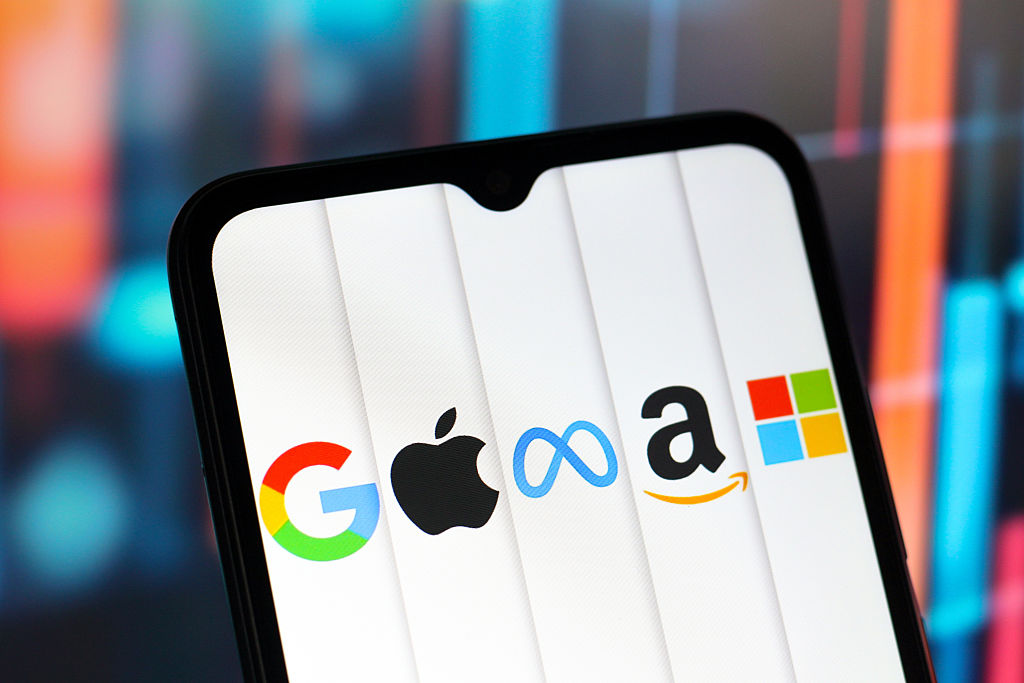
Get the latest financial news, insights and expert analysis from our award-winning MoneyWeek team, to help you understand what really matters when it comes to your finances.
You are now subscribed
Your newsletter sign-up was successful
Want to add more newsletters?
Britain’s investment establishment is firmly convinced that the US market – and in particular the technology-centric “Magnificent Seven” stocks – are an investment bubble that is destined to implode as the “hype” surrounding AI dissolves. Terrified by the speed and scale of the bull market, which they failed to foresee, they are desperately waiting for a repeat of the 2000-2003 collapse.
In the US, they think differently. The Magnificent Seven’s market share of the S&P 500 has doubled to 32% since the end of 2022, while its share of corporate earnings has risen from 13% to 23%, points out veteran strategist Ed Yardeni. The share of the information technology and communication services sector in the S&P index has just passed the peak of 40% reached in early 2000, but it now accounts for 37% of forward earnings against a peak of 24% in early 2000. So long as the earnings growth of the S&P 500 and the tech sector continues, the doomsters on this side of the Atlantic will keep being disappointed.
The AI maximalists
The bearish UK consensus makes the bullishness of the team managing the £5 billion Polar Capital Technology Trust (LSE: PCT) almost contrarian. Ben Rogoff, the lead manager, describes the team as “AI maximalists” who believe that AI will change the world and have focused the portfolio accordingly. Since April, AI winners have outperformed AI losers by 50%, he says. This accounts for the 36% return of the trust, compared with 27% for its tech sector benchmark. This followed a dull year in which the trust returned just 3% compared with a benchmark return of 5%.
Try 6 free issues of MoneyWeek today
Get unparalleled financial insight, analysis and expert opinion you can profit from.

Sign up to Money Morning
Don't miss the latest investment and personal finances news, market analysis, plus money-saving tips with our free twice-daily newsletter
Don't miss the latest investment and personal finances news, market analysis, plus money-saving tips with our free twice-daily newsletter
That said, Rogoff warns investors to expect volatility: “it’s pretty normal in a time of change”. During the 1995-1998 bull market, there were seven setbacks of more than 15%.
“You’ll only hear negative things about AI,” he says, “but we refute very strongly that we are in an AI bubble, rather a transformative technology era.” In periods of transformative change, the pace of improvement is very rapid. The invention of lifts by Otis in 1885 enabled the construction of skyscrapers and a trebling in the height of buildings to 42 metres. The Empire State Building, which was completed 46 years later, multiplied this nine-fold to 381 metres.
Explosive growth in AI
Global annual spending on information technology was $5.4 trillion last year, but the global wage bill was $44 trillion. “Therein lies the market opportunity.” Growth in AI has been explosive as it quickly became a corporate imperative: there are 700 million weekly users of OpenAI and one billion for Meta AI. Investors were briefly taken aback by China’s DeepSeek bursting onto the market, but Rogoff sees it as just a milestone on the path of progress with the cost likely to collapse. “This is a feature of the tech model, not a bug.”
The capital expenditure by the largest tech companies continues to rise, with compound annual growth of 40% expected between 2023 and 2027. “If DeepSeek was a problem, they wouldn’t be spending this,” says Rogoff. Yet AI capex still accounts for under 1% of US GDP. By comparison, “railroad capex reached 3% in the 19th century”.
While AI is an opportunity for some, it is a threat to others. Intel, the best semiconductor company in its time, started to lose investors’ confidence in 2015 “when they realised it wouldn’t be the conduit to the world of cloud storage”. Now software firms Adobe and Chegg are AI casualties because “the market is a discounting mechanism and so looks well ahead. AI is scaling faster than Moore’s law”. (Moore’s law is the 1975 prediction by the cofounder of Intel that the number of transistors on a microchip would double every two years – a trend for the growth of computing power.)
A broad portfolio with an AI focus
The trust’s portfolio has 90-110 stocks, “almost all explained by our AI focus”, but “we are not afraid to have zero weightings in firms in our benchmark”. A broad portfolio enables the managers to have benchmark or underweight positions in firms where they do not have a strong conviction, such as Oracle (up nearly 40% in a day recently) and Palantir (very pricey, “but you have to look at the scale of the opportunity”). Quantum computing is an “exciting technology, but despite significant breakthroughs in the last two years, it is still pre-revenue and at least five years away from profitability”.
Inevitably, nearly 75% of the portfolio is US listed, with less than 1% in the UK, while 97% is in firms with a market valuation above $10 billion. “We have twice the growth of the index for a limited valuation premium.” A third of the portfolio is in the Magnificent Seven, “but we expect that to come down”. Avoid a holding at your peril.
This article was first published in MoneyWeek's magazine. Enjoy exclusive early access to news, opinion and analysis from our team of financial experts with a MoneyWeek subscription.
Get the latest financial news, insights and expert analysis from our award-winning MoneyWeek team, to help you understand what really matters when it comes to your finances.

Max has an Economics degree from the University of Cambridge and is a chartered accountant. He worked at Investec Asset Management for 12 years, managing multi-asset funds investing in internally and externally managed funds, including investment trusts. This included a fund of investment trusts which grew to £120m+. Max has managed ten investment trusts (winning many awards) and sat on the boards of three trusts – two directorships are still active.
After 39 years in financial services, including 30 as a professional fund manager, Max took semi-retirement in 2017. Max has been a MoneyWeek columnist since 2016 writing about investment funds and more generally on markets online, plus occasional opinion pieces. He also writes for the Investment Trust Handbook each year and has contributed to The Daily Telegraph and other publications. See here for details of current investments held by Max.
-
 Student loans debate: should you fund your child through university?
Student loans debate: should you fund your child through university?Graduates are complaining about their levels of student debt so should wealthy parents be helping them avoid student loans?
-
 Review: Pierre & Vacances – affordable luxury in iconic Flaine
Review: Pierre & Vacances – affordable luxury in iconic FlaineSnow-sure and steeped in rich architectural heritage, Flaine is a unique ski resort which offers something for all of the family.
-
 8 of the best properties for sale with minstrels’ galleries
8 of the best properties for sale with minstrels’ galleriesThe best properties for sale with minstrels’ galleries – from a 15th-century house in Kent, to a four-storey house in Hampstead, comprising part of a converted, Grade II-listed former library
-
 The rare books which are selling for thousands
The rare books which are selling for thousandsRare books have been given a boost by the film Wuthering Heights. So how much are they really selling for?
-
 What is physical AI, and how can you invest in it?
What is physical AI, and how can you invest in it?Artificial intelligence is increasingly taking physical form and could completely transform how we live. How can investors gain exposure?
-
 How to invest as the shine wears off consumer brands
How to invest as the shine wears off consumer brandsConsumer brands no longer impress with their labels. Customers just want what works at a bargain price. That’s a problem for the industry giants, says Jamie Ward
-
 A niche way to diversify your exposure to the AI boom
A niche way to diversify your exposure to the AI boomThe AI boom is still dominating markets, but specialist strategies can help diversify your risks
-
 New PM Sanae Takaichi has a mandate and a plan to boost Japan's economy
New PM Sanae Takaichi has a mandate and a plan to boost Japan's economyOpinion Markets applauded new prime minister Sanae Takaichi’s victory – and Japan's economy and stockmarket have further to climb, says Merryn Somerset Webb
-
 Early signs of the AI apocalypse?
Early signs of the AI apocalypse?Uncertainty is rife as investors question what the impact of AI will be.
-
 8 of the best properties for sale with beautiful kitchens
8 of the best properties for sale with beautiful kitchensThe best properties for sale with beautiful kitchens – from a Modernist house moments from the River Thames in Chiswick, to a 19th-century Italian house in Florence
